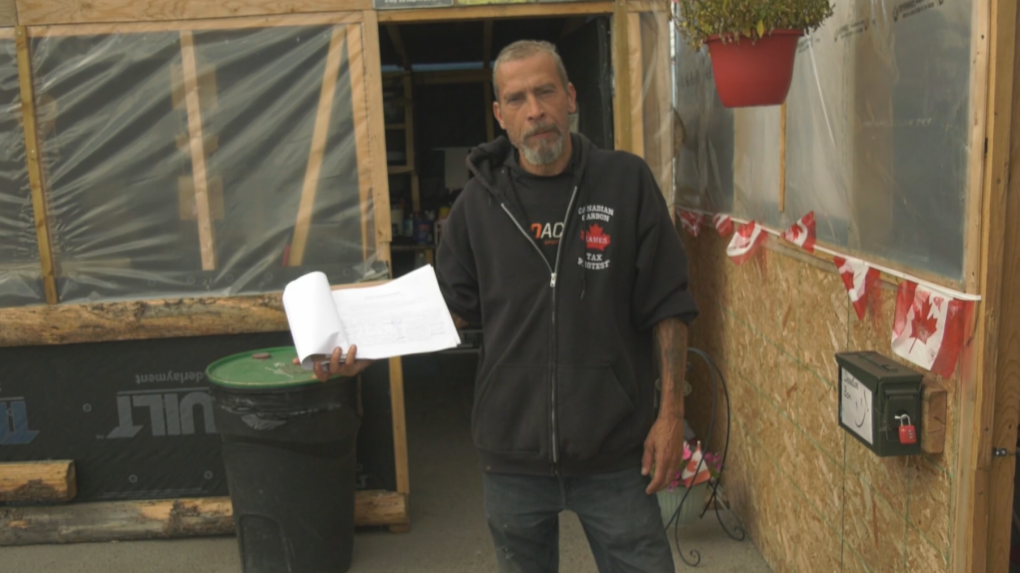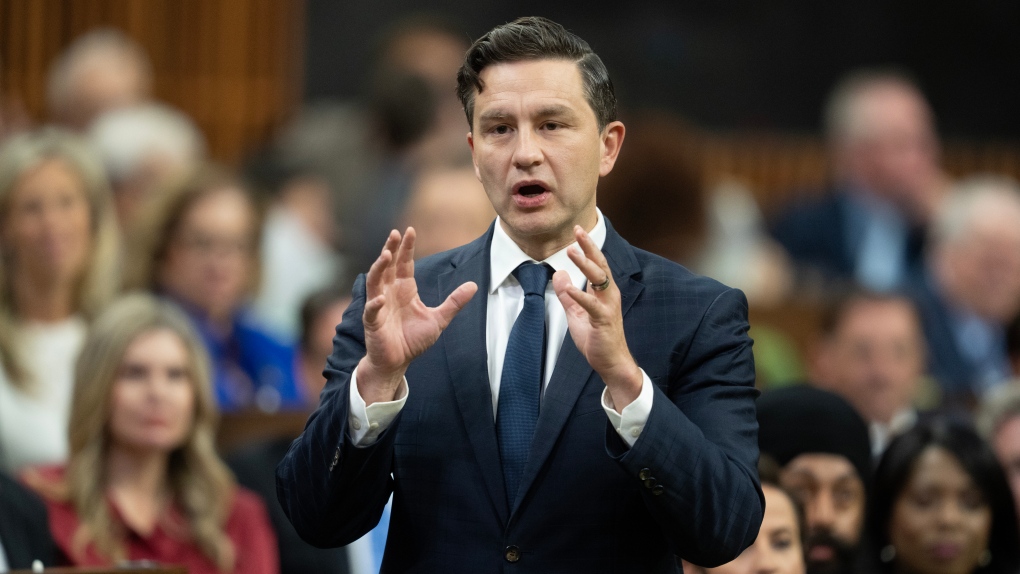Alberta protesters stand pat near Trans-Canada Highway as Conservatives push for 'carbon tax election' in Ottawa
As Canadian members of parliament debate a motion that the federal Conservatives hope triggers a snap "carbon tax election," a group of protesters remains stationed on the side of the Trans-Canada Highway near Calgary – as they have for months – rallying against the federal government's price on pollution.
The political discourse is heating up in the House of Commons Tuesday as the Conservatives put forth a non-confidence motion against the Liberal government.
Despite a high chance of the motion being struck down, southern Alberta carbon tax protesters like James Van Allen say Canadian voters deserve a seat at the table and to have their views heard sooner rather than later.
“We need to go into an election, whatever triggers it, I don't really care. I mean when you talk about the non-confidence, how many scandals do you need to have with a person like Trudeau? It’s endless,” he said.
“Jagmeet Singh is propping up Trudeau, and now the Liberals are cutting a deal with the Bloc Quebecois and all this other kind of stuff. It's got to just stop. Let's let the chips fall where they may. Let's hear Canadians speak again.”
Van Allen has been protesting along the Trans-Canada Highway just west of Calgary near a Petro-Canada truck stop since the latest carbon tax increase on April 1 when the federal government raised the price of carbon from $65 per tonne to $80 per tonne.
In a statement Tuesday, the Government of Alberta confirmed it owns and operates the public land the protesters are set up on.
"While there are no specific rules to prevent overnight camping at these locations, these spaces are intended for use by truckers to weigh their vehicles. This mobile weight station near Cochrane remains open to commercial vehicles," a spokesperson with the ministry of transportation and economic corridors said in the statement.
"The RCMP are monitoring the situation and will take necessary actions should protesters pose a hazard to public safety."
 James Van Allen shows off a petition advocating for the end of the carbon tax. (CTV News)
James Van Allen shows off a petition advocating for the end of the carbon tax. (CTV News)
Van Allen is calling on all levels of government to recognize the "egregious tax" which is charged cumulatively to the consumer.
“When a farmer has to dry his grain, he's not going to pay that, he can't afford to pay it, so it cuts right out of the bottom line. He's going to pass it on and by the time you get a loaf of bread, you’ve paid that carbon tax at least five times,” said Van Allen.
“It’s being pushed down to us. This is why I’m here. Cumulative taxation is murdering us in Canada, it is killing us. It's choking our economy out, and we are dying. A political solution is not, ‘Hey, go to the food bank.’ That is not a political solution in a healthy country.”
Van Allen added that more than 4,000 people have signed a petition to axe the carbon tax at rallies across Southern Alberta and that he "wishes for open debate to come back."
He also cited from the Canadian Taxpayers’ Federation that the carbon tax will cost Canadians about $911 more than what they see in rebates.
All the while, he says politicians are taking pay raises during an affordability crisis.
MPs received a raise of between $8,500 and $17,000 on April 1, meaning a backbench MP's salary is now $203,100, a minister's salary is $299,900 and the prime minister is earning $406,200.
As for how long Van Allen and others will protest on the provincial government-owned land, he says he will keep fighting for his country for as long as it takes.
“I'm a provincial taxpayer and this is classified as public property. We don’t live here and we're not staying here. None of our structures are permanent and they can all be gone on a car carrier in 40 minutes,” said Van Allen.
'A return to the Canadian promise': Poilievre
In a 20-minute speech on Tuesday, Conservative Leader Pierre Poilievre demanded a return to what he called "the Canadian promise."
“That promise, after nine years of the NDP-Liberal prime minister, is broken,” Poilievre said.
The Conservative motion, which states," That the House has no confidence in the Prime Minister and the government,” is being debated Tuesday. MPs will vote on Wednesday.
Poilievre first promised this motion weeks ago, after NDP Leader Jagmeet Singh’s announcement he’d scrapped the supply-and-confidence agreement with the Liberals. The end of the pact meant that, for the first time in two-and-a-half years, NDP support of the government was no longer guaranteed.
 Conservative Leader Pierre Poilievre rises during Question Period, in Ottawa, Tuesday, Sept. 24, 2024. THE CANADIAN PRESS/Adrian Wyld
Conservative Leader Pierre Poilievre rises during Question Period, in Ottawa, Tuesday, Sept. 24, 2024. THE CANADIAN PRESS/Adrian Wyld
However, Singh and Bloc Québécois Leader Yves-François Blanchet confirmed last week they’ll vote against the motion, throwing cold water on the possibility of toppling the government and going into a snap election.
Poilievre, in his speech in the House of Commons on Tuesday, reiterated his plan to “axe the tax, build the homes, fix the budget and stop the crime,” and again promised “this will be a carbon tax referendum, a carbon tax election.”
“That is our vision,” Poilievre concluded. “That is our purpose. Let’s bring it home.”
The Conservatives will have another opportunity to table a non-confidence motion during their next opposition day, scheduled for Thursday.
Government House Leader Karina Gould accused Poilievre of celebrating “revisionist history,” for the portions of his speech lauding the Conservatives’ previous time in government.
She said she remembers Canadians being “ashamed” of the country’s international reputation and its lack of climate policy under the last Conservative government.
During the debate, Singh used his time to ask directly whether Poilievre would get rid of the dental care plan brought in as a cornerstone policy of the supply-and-confidence agreement.
Poilievre didn’t specifically answer, saying instead he wanted to “correct the falsehoods” about his record on health care, and criticizing the NDP’s pharmacare proposals.
“We're going to vote today against Conservative cuts and against the Conservative motion,” Singh said, after accusing the Conservatives of cutting health care under former prime minister Stephen Harper, and of planning to cut dental care and pensions if Poilievre’s Conservatives form government.
Singh also took aim at the Liberals, criticizing their record on health care and calling them “too weak to stand up to” Conservative premiers.
Without the guaranteed support of the NDP, the Liberals need support from other parties to stay in power. Blanchet and the Bloc, for their part, are leveraging their new voting power to push the Liberals to vote in favour of expanding and increasing pensions for seniors.
Deputy Prime Minister and Finance Minister Chrystia Freeland was asked Tuesday about the Bloc's demand and whether that's something the federal government can afford. While she didn't directly answer, she cited existing Liberal policies for seniors.
"When it comes to further support for seniors, we are having good conversations about all possible economic measures with both the Bloc and the NDP, and those conversations are ongoing," she said.
While his government’s record was being debated on Parliament Hill, the prime minister was in New York City, where he faced questions from reporters about his leadership.
"Obviously, the Conservatives are very much thinking about power right now,” Trudeau said. “I'm thinking about how we can best help Canadians."
With files from CTV News National Correspondent Rachel Aiello
CTVNews.ca Top Stories

Aviation experts say Russia's air defence fire likely caused Azerbaijan plane crash as nation mourns
Aviation experts said Thursday that Russian air defence fire was likely responsible for the Azerbaijani plane crash the day before that killed 38 people and left all 29 survivors injured.
Police identify victim of Christmas Day homicide in Hintonburg, charge suspect
The Ottawa Police Service says the victim who had been killed on Christmas Day in Hintonburg has been identified.
Teen actor Hudson Meek, who appeared in 'Baby Driver,' dies after falling from moving vehicle
Hudson Meek, the 16-year-old actor who appeared in 'Baby Driver,' died last week after falling from a moving vehicle in Vestavia Hills, Alabama, according to CNN affiliate WVTM.
Boxing Day in Canada: Small retailers fear big shopping day won't make up for tough year
It’s one of the busiest shopping days of the year: Boxing Day sees thousands of people head to malls and big box stores to find great deals. But it's not so simple for smaller shops.
Raised in Sask. after his family fled Hungary, this man spent decades spying on communists for the RCMP
As a Communist Party member in Calgary in the early 1940s, Frank Hadesbeck performed clerical work at the party office, printed leaflets and sold books.
Sinkhole prompts lane closures on Interstate 80 in New Jersey
A sinkhole that opened up Thursday along Interstate 80 in northern New Jersey forced authorities to close the heavily travelled highway's eastbound lanes.
Cat food that caused bird-flu death of Oregon pet was distributed in B.C.: officials
Pet food contaminated with bird flu – which killed a house cat in Oregon – was distributed and sold in British Columbia, according to officials south of the border.
Police in New Brunswick investigating Christmas Eve sudden death
An unconscious individual was found in the 600-block area of Lancaster Avenue early Christmas Eve morning, and was later pronounced dead at a hospital.
Pizza deliverer in Florida charged with stabbing pregnant woman at motel after tip dispute
A pizza deliverer in central Florida has been charged with pushing her way into a motel room with an accomplice and stabbing a pregnant woman after a dispute over a tip, authorities said.































